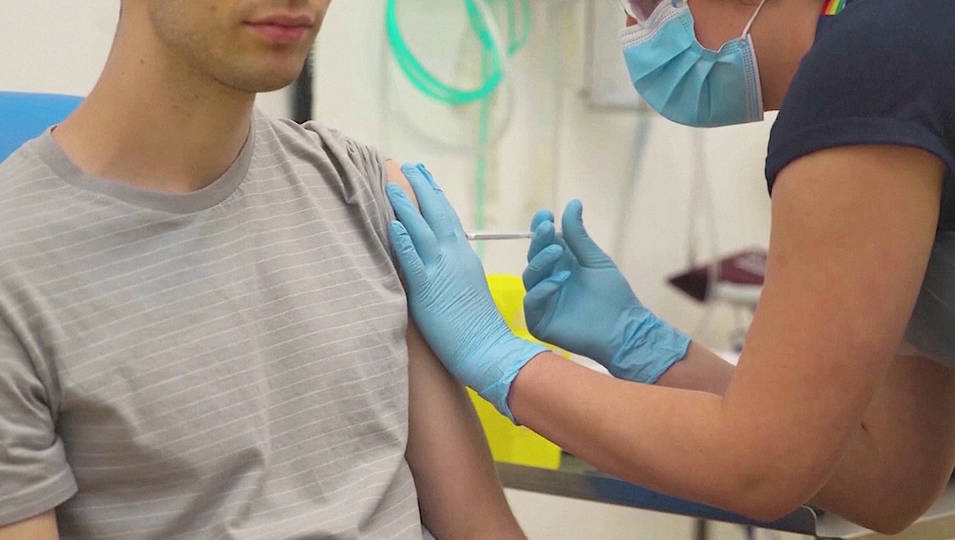
A new report urges nations to suspend or modify intellectual property protections for COVID-19 jabs to accelerate vaccine production. [Photo: Mike Hutchings/Reuters]
New York, March 12 (RHC)-- Nobel Prize-winning economists Joseph Stiglitz and Michael Spence are spearheading calls for urgent action to help poorer countries recover from the economic ravages of the coronavirus pandemic, including measures to advance vaccine equity, debt relief, and bolstering fiscal resources for cash-strapped nations.
The proposals were outlined in a new interim report released on Thursday – the one-year anniversary of the global pandemic – by the Institute for New Economic Thinking’s Commission on Global Economic Transformation, co-chaired by Stiglitz and Spence.
“Extraordinary times call for extraordinary measures,” Spence said in the report. “Failing bold action, developing countries could be on track to lose years or even decades of progress in the post-pandemic world.”
Highlighting the interconnected nature of the global economy, the report urges nations to suspend or modify intellectual property protections for COVID-19 jabs, treatments, tests and products to accelerate vaccine production, get more people inoculated sooner – including in rich countries- and stay ahead of mutations.
“In the developing world, many of them are not scheduled to get the vaccines for years to come unless we change what’s going on,” Stiglitz told reporters during a virtual press conference to launch the report.
“The world is not going to be safe from the pandemic itself until the pandemic is controlled everywhere in the world, so in that sense, it’s even in our own self-interest that there be a rapid dissemination of the vaccines and the other medicines, the mass tests that help control the pandemic,” he added.
World Trade Organization talks this week saw richer nations block an effort by dozens of other countries to temporarily waive intellectual property protections for COVID-19 vaccines. Those opposed to such measures, including the US Chamber of Commerce, argue it would hamper the development and distribution of vaccines and treatments for future pandemics.
But the report notes that Big Pharma firms have benefitted from massive government support to research and develop COVID-19 vaccines, and in some cases had nearly all of their research and development costs covered by taxpayer funds.
“What we’ve seen in the last few months is a very unseemly vaccine grab by rich governments, which have basically booked about 85 percent of global supply for 2021,” Jayati Ghosh, a member of the Commission on Global Economic Transformation and a professor of economics at the University of Massachusetts Amherst, told reporters during the press conference.
“Some countries have booked several multiples of their populations for the vaccines, between four to 10 times the number that they would actually need, and this means the developing countries have been not just excluded but they’re unlikely to get vaccines, sometimes, in some cases, until 2023-24,” she added.
The report applauds governments for throwing out their policy rule books and doing “whatever it takes” to spend big to shore up economies and throw lifelines to those hit hardest by the pandemic. But it also highlights the stark disparities between nations in the amount of fiscal firepower deployed. Developed countries are expected to have mounted $9,836 per person in stimulus spending compared to $17 per person by the least developed countries, according to International Monetary Fund (IMF) estimates from January.
To help give poorer nations more “fiscal space” to combat COVID-19 and its fallout, the report advocates a large issuance of Special Drawing Rights (SDRs) – a reserve asset (think artificial currency) created by the IMF from a basket of currencies.
Advocates of SDRs see them as a low-cost way of bolstering the international reserves of member states during times of extreme stress. A proposal to create new SDRs at the start of the global pandemic in March 2020 reportedly met resistance from the United States. But newly minted US Treasury Secretary Janet Yellen has backed a new issuance.
“This would immediately provide developing countries with an increase in their reserves and enable them to engage in much-needed public expenditure with less concern for the effects on the external balance,” said the report. “It could also provide some means of repayment for countries with pressing external debt problems.”
Some 120 low-income countries collectively owe $3.1 trillion of external debt – a burden that is shackling poorer nations by holding back their ability to spend, said the report, including those whose debt repayments were manageable prior to the pandemic.
“This calamity put them over the brink as it were,” said Stiglitz. “Their debts are beyond their ability to pay, given the depth of the global economic downturn and a downturn in some of their countries.”
For the hardest-hit countries, the report is advocating “not just a debt moratorium, which simply kicks the can down the road while making the debts owed by the developing countries larger, but a deep and timely debt restructuring.”

